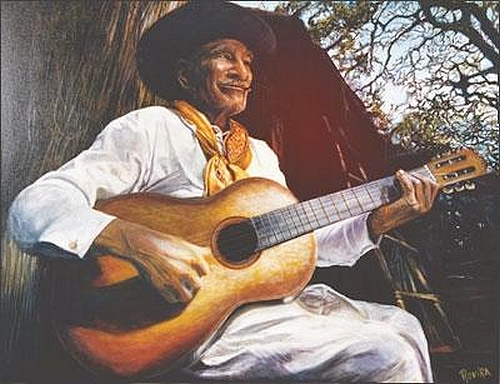Last December, in a concert of the LIFE Victoria, Mercedes Gancedo and Beatriz G. Miralles performed Triste, one of the Cinco canciones populares by Alberto Ginastera, and I jotted it down to talk about it during the season. Then I thought it would be nice to share with you that performance, and it would be even better than Mercedes, Argentinian as the composer, spoke about the song. Many thanks to Victoria de los Ángeles Foundation (LIFE organizer), for providing me with the video of the concert and to Mercedes Gancedo for writing this post and telling us what Triste suggests to her. Her words will take us to the Pampas, that's why I like guest posts!
One last thing before you read and hear Mercedes: in a few days, on July 16, she and Francisco Poyato will perform Ginastera's song cycle in Camprodon, a lovely village in the Pyrenees where the 32nd Festival Albéniz will take place.
One last thing before you read and hear Mercedes: in a few days, on July 16, she and Francisco Poyato will perform Ginastera's song cycle in Camprodon, a lovely village in the Pyrenees where the 32nd Festival Albéniz will take place.

Acordes de la tradición - G. Rovira
A stone rolls in the desert, not moved by a gentle breeze or a mad blizzard, but by and old gaucho that, in the midst of the glowing heat, kicks it. A shy tear makes its way between the dry land and his forgotten cheeks and vanishes into the corner of his dry lips, hardly moistening them. The stone rolls on the plane; he seems to expect that it blooms into blue eyes like a bud wet with the morning dew.
Like a faithful scrawny dog that goes with the wanderer through the endless pampas, sadness rambles, following him, hardly raising its eyes towards him. From time to time it looks as if guided by the stars, his back, embellished with a tired guitar and a calabash of dried yerba mate in his trousers.
A river of muffled tears, dry because of the bitterness, which rejects the reflection of a cloud that crosses it, before it disappears in its last speck of oblivion smoke. In his own shadow, the old gaucho strums his guitar. It used to be his balm, the friend made of pine that, wrapped in ropes, so many dances wove, but today it's only the place where his hands rest, the hands of a gaucho that seems not to remember how his zamba [an Argentinian dance] was like, how his peace was like.
Like a faithful scrawny dog that goes with the wanderer through the endless pampas, sadness rambles, following him, hardly raising its eyes towards him. From time to time it looks as if guided by the stars, his back, embellished with a tired guitar and a calabash of dried yerba mate in his trousers.
A river of muffled tears, dry because of the bitterness, which rejects the reflection of a cloud that crosses it, before it disappears in its last speck of oblivion smoke. In his own shadow, the old gaucho strums his guitar. It used to be his balm, the friend made of pine that, wrapped in ropes, so many dances wove, but today it's only the place where his hands rest, the hands of a gaucho that seems not to remember how his zamba [an Argentinian dance] was like, how his peace was like.
Ah! Ah!
Debajo de un limón verde
Donde el agua no corría
Entregué mi corazón
A quien no lo merecía.
Ah!
Triste es el día sin sol
Triste es la noche sin luna
Pero más triste es querer
Sin esperanza ninguna.
Ah!
Ah! Ah!
Under a lime tree
where the water didn't run
I gave my heart
to her, who didn't deserve it
Ah!
Sad is the day without the sun
Sad is the night without the moon
But sadder is to love
hopeless.
Ah!
Pain caused by unrequited love, deceit or distance are sufferings that can be said to appear all over the world. But the rhymes and poetry collected in Salta and Jujuy by Carlos Guastavino, his Cuatro canciones argentinas (Four Argentinian Songs), as well as the poems from the folk song book of the Cinco canciones argentinas (Five Argentinian Songs) by Alberto Ginastera make reference to those issues with such passion, that we get the feeling that they always tell the same love, the same sorrow during their stages. The vast pampas, masterly imprinted in the rests of the music, reflect not only the unhurried temperament of the gaucho but also the landscape that in his thick desert is crowned with some other tree.
In the city or in the Pampa, the pain doesn't change. Under the same sky, the souls labour to find their lost love and, although their song is different, they share the sweet grief of longing.
Triste (Sad) is the second of those Five Songs by Alberto Ginastera, his opus 10, a cycle of Argentinian folk dances. With respect to Triste, it's a blurred dance, as if it were a forgotten rhythm. Love is the true constant rhythm of the cycle, where the clearness and simpleness of the countryside are expressed in brief traditional verses of great beauty.
In the city or in the Pampa, the pain doesn't change. Under the same sky, the souls labour to find their lost love and, although their song is different, they share the sweet grief of longing.
Triste (Sad) is the second of those Five Songs by Alberto Ginastera, his opus 10, a cycle of Argentinian folk dances. With respect to Triste, it's a blurred dance, as if it were a forgotten rhythm. Love is the true constant rhythm of the cycle, where the clearness and simpleness of the countryside are expressed in brief traditional verses of great beauty.
Triste













Comments powered by CComment